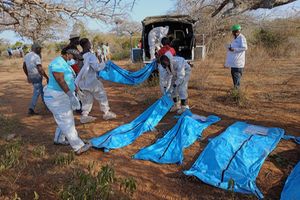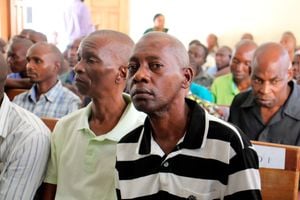
Suspected Kilifi cult leader Paul Mackenzie in Mombasa Law Court on January 23, 2024
Controversial preacher Paul Mackenzie has suffered yet another setback after the Court of Appeal in Malindi reinstated 191 murder charges against him. This is in relation to the Shakahola massacre of over 450 followers of his Good News International church.
Appellate judges Kibaya Laibuta, Weldon Korir, and Ngenye Macharia ruled that the length of a trial — cited by Mackenzie and his 30 co-accused as a concern due to the high number of charges — cannot, on its own, justify the severance of counts, unless justice demands it.
“We do not see how this case can be termed complex on account of the perceived ‘overload’ of counts. The very fact that they jointly face one charge of murder allegedly perpetrated by means of the same series of acts or transactions dispels the fear that the trial would prejudice them,” the judges stated.
The judges noted that while Malindi High Court Judge Mugure Thande correctly identified the general legal principles concerning the joinder or severance of charges, she erred in the application of those principles to the circumstances of this case.
As a result, they found fault with her decision to reject the inclusion of 191 counts in the charge sheet.
The appellate bench supported the prosecution's position that, apart from identifying the individual bodies — where possible — through their next of kin, the evidence of the cause of death in one case would generally apply to the others, unless contradicted by post-mortem results.
They further observed that the same pathologists would produce the 191 post-mortem reports, and formal witnesses, such as investigating officers, would testify regarding their findings.
The judges argued that the accused, who are represented by a single counsel, would still have the opportunity to present individual defences.
“Consequently, the impugned part of the ruling and orders of Justice Thande, dated May 17, 2024, directing the Office of the Director of Public Prosecutions (ODPP) to reduce the charges to no more than 12, is hereby set aside,” the judges ruled.
They recommended that the Shakahola murder trial be heard on a daily basis by a designated High Court judge to ensure its swift conclusion.
“If it pleases Chief Justice Martha Koome, we humbly recommend that, given the public interest in this matter, a High Court judge be appointed to hear the case on a day-to-day basis until its final determination,” they added in their April 11, judgment.
Addressing the ODPP's claim that Justice Thande had overstepped her mandate by directing the number of charges to be limited, the appellate court found no evidence that she had contravened the DPP’s constitutional powers.
While acknowledging that the ODPP is an independent constitutional office not subject to external direction or control, the judges emphasised that it remains bound by constitutional imperatives such as fair trial and justice administration — matters over which the High Court has an essential role.
“Neither was the judge in violation of the Criminal Procedure Code, as claimed by the ODPP. She properly invoked her judicial autonomy and exercised her discretionary powers in the discharge of her duty, in a context where neither the Constitution, statute law, nor procedural rules dictate a particular course of action,” the judges stated.
Mackenzie and his 30 co-accused were originally charged with the murder of 191 known and unknown persons, but Justice Thande had rejected this and instructed the ODPP to reduce the charges to a maximum of 12.
In her ruling dated May 17, 2024, Justice Thande argued that it was neither in the public interest nor in the interest of justice to prosecute the accused using a charge sheet overloaded with 191 murder counts. She termed the case virtually unmanageable and likely to drag on unnecessarily.
Following her ruling, the ODPP appealed, led by Senior Assistant Director of Public Prosecutions for Mombasa, Peter Kiprop. He criticised the decision as legally flawed, asserting that the judge failed to apply the proper legal tests before issuing the directive.
Mackenzie and his associates were formally charged in January last year with the murder of 191 children.
The charge sheet states that, on diverse dates between January 2021 and September 2023, the suspects jointly murdered Nathan Mathu, Evabra Dito, Seth Ngala, Sifa Edison, and 187 others in the Shakahola area, Kilifi County. They all pleaded not guilty.
However, after entering their pleas, the accused challenged the charges, claiming the charge sheet was defective and that the 191 murder counts were oppressive and unconstitutional.
They further argued that all 31 accused persons were charged with the murder of the same individuals over a period of three years between January 2021 and September 2023.
Following the Court of Appeal's ruling, however, the suspects will now face trial on all 191 murder counts, as originally filed in the charge sheet.









